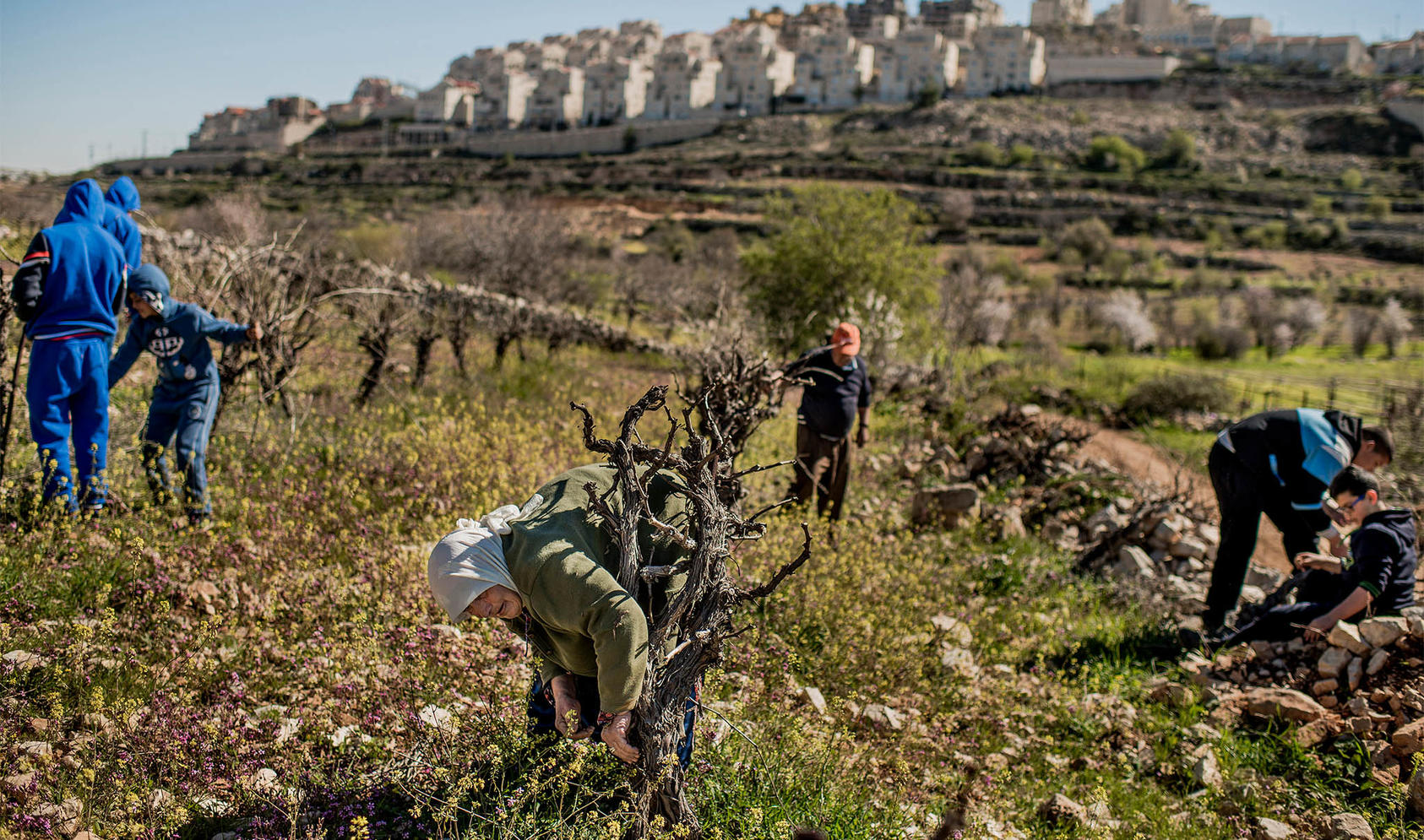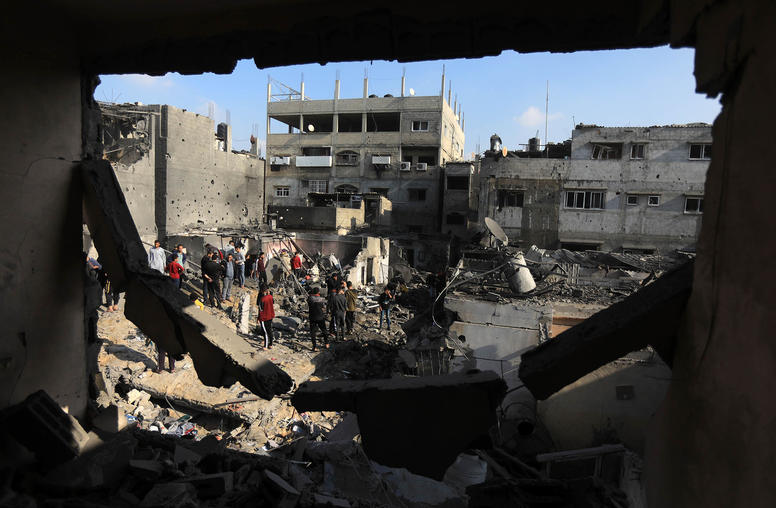A New ‘Quartet’ for Israeli-Palestinian Peace
European-Arab group takes a stand to avert Israeli annexation and return to negotiations.
Good news for Israeli-Palestinian peacemaking seems rare, but this month’s diplomatic initiative by four states influential in Europe and the Middle East is a constructive development that should continue. On July 7, Egypt, France, Germany and Jordan joined to oppose Israel’s declared intent to annex territory that it has occupied since 1967. Vital actors, including Arab states and the European Union, have been unable to stop the march toward annexation and the attendant risks of renewed violence. Yet a partnership of key Arab and European states—the latest in a string of diplomatic “quartets” on the conflict—offers a foothold on which to build.

The four foreign ministers issued a statement declaring that “any annexation of Palestinian territories occupied in 1967 would be a violation of international law” and that the four states “would not recognize any changes to the 1967 borders that are not agreed by both parties in the conflict.” Any annexation “would have serious consequences for the security and stability of the region and would constitute a major obstacle to efforts aimed at achieving a comprehensive and just peace,” the statement said. It warned that such a step “could also have consequences for the relationship with Israel” and confirmed the “firm commitment to a negotiated two-state-solution based on international law and the relevant U.N. resolutions.” Looking to the future, the foreign ministers said they “discussed how to restart a fruitful engagement between the Israeli and the Palestinian side, and offer our support in facilitating a path to negotiations.”
Some observers may wonder what is new or helpful here. As Israeli officials have declared an intent to annex portions of the West Bank, dozens of states, politicians, organizations, renowned personalities and others have spoken against any such move. Disparate analysts, including retired senior Israeli security officials, have noted the risks: a new spasm of bloodshed, a collapse of the Palestinian Authority and a destabilization of Jordan. However, the attributes of this new quartet lend it the potential for some real impact over the issue. Critically, the group combines influence in both Europe and the Arab world, and good relations with Israel and the U.S. administration.
A Pattern of ‘Quartets’
It seems that the Israeli-Palestinian conflict is more prone to the establishment of diplomatic “quartets” than other international conflicts. Groups of states have intermittently banded together in search of solutions, or at least conflict management. This one constitutes the third quartet.
The “Middle East Quartet”—combining the United States, Russia, the European Union and the United Nations—has been less active of late than at its inception in 2002. After years in which mediation had been largely a U.S. venture, this quartet aimed to broaden the set of diplomatic brokers, and to balance American positions through inclusion of the other parties. The quartet’s most noted effort was its endorsement of the U.S.-led “roadmap to peace” in 2003—an initiative that at first spurred some optimism, but that fell apart in the mid-2000s.
After years in which this original quartet faded in relevance, recent events led Palestinian President Mahmoud Abbas to evoke it once again. With the Israeli moves toward annexation, and the Trump administration proposal on the conflict, Abbas declared that the Palestinians will not accept negotiations brokered exclusively by the United States, but rather could negotiate only under the auspices of the international quartet.
The second quartet—Egypt, Jordan, Saudi Arabia and the United Arab Emirates—was established by the Arab League in 2007 to revive peace efforts. This “Arab Quartet” also was active at first, only to become dormant amid a range of developments. These included Arab and regional instability; Saudi-Emirati preoccupation with Iran, Yemen and other regional conflicts; Egypt’s preoccupation with the Nile River negotiations with Ethiopia and Sudan, the conflict in Libya, and a number of pressing internal challenges; and a general feeling that there is very little hope to advance a solution to the Israeli-Palestinian conflict.
Still, like the original Middle East Quartet, the Arab quartet remains influential – Israelis generally accord high importance to the relationship with King Abdullah of Jordan and are enthusiastic about steps toward warmer relations with the Arab World. This is not lost on Prime Minister Benjamin Netanyahu, who has centered his recent political campaigns on his diplomatic prowess strengthening such ties. Messages from key Arab States also seem to land in Israel. The Emirati ambassador to the United States, Yousef al-Otaiba, warned in a Hebrew-language opinion essay last month in Israel’s Yedioth Ahronoth that annexation would “upend” any prospect for better Israeli relations with the Arab world. It raised serious discussion among Israelis.
The New Quartet: Constructive Differences
What assets, and what hope, might this new, third quartet bring to an old, exhausting conflict? Might it fare better than its predecessors in building momentum and advancing diplomacy? At the least, this European-Arab initiative combines some complementary strengths despite nuanced differences—and carries the potential for a constructive role.
France and Germany may be able to represent the concerns shared by many European states more nimbly than the European Union. The EU has said that annexation “could not pass unchallenged.” But in considering specific actions, the bloc faces difficulties in achieving the required unanimity among its 27 member states. With individual states left to respond on their own, France and Germany—among the bloc’s most influential members—have strongly opposed annexation plans, but only in the past month seem to have progressed in developing a strategy. The French foreign minister last month told the Senate that the government would consider punitive economic and commercial measures if Israel should annex territory. Germany’s foreign minister visited Jerusalem to express Berlin’s “serious and honest worries” about annexation but refrained from publicly discussing sanctions, arguing that now is not the time for threats.
The Arab partners have used different approaches to their diplomacy. Egypt has sent clear messages to both the United States and Israel but has mainly communicated its objections behind closed doors. Jordan, with the highest stakes and bordering a region targeted for annexation, has acute concerns and has been much more vocal.
Egypt and Jordan, the only Arab countries with peace treaties with Israel, have significant influence in the Arab quartet and on the Arab position pertaining to this conflict. Similarly, France and Germany play a central role in Europe, and on EU positions within the Middle East Quartet. There are also some key leverage points these countries hold. The Israeli public and leadership accord significant value to the peace treaties with Egypt and Jordan. The European Union is both Israel’s largest trading partner and the biggest provider of assistance to the Palestinians, with France and Germany key players in both categories. Finally, all four countries generally enjoy good relations with the U.S. administration. While it is unlikely that the United States will be replaced as a key third party in this conflict, this new quartet could serve as a helpful bridge between the Israelis and the Palestinians on one hand and between the Middle East Quartet and the Arab Quartet on the other.
The peace process is in trouble, and a drowning man has no choice but to clutch at a straw. But while new quartets alone won’t resuscitate a process, this partnership offers a rare creative development and a tool for a constructive path ahead.



